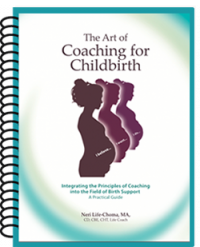
What You Miss by Overlooking Birth Support Clients’ Motivations
- “I would like to experience a natural birth” vs. “The idea of taking an Epidural scares me more than childbirth itself”.
- “I feel safe and confident at home, and that’s why I would like to have a home birth.” vs. “I’m afraid of going into the hospital because of the outbreak of Coronavirus”.
- “Being intimate with my partner is what’s most important to me in terms of my ideal birth experience” vs. “I’m afraid a doula in the room is one more opinion to deal with”.
The statements above show that more and more expectant individuals are aware of their choices and options, and this is great! For many decades, birth support professionals have worked hard to promote the notion of birth givers’ right of choice and to spread the idea of advocacy throughout the journey of pregnancy and childbirth. Our goal was to empower birth givers so they don’t feel they have to obey experts who confuse being knowledgeable with being an authority. At the same time, we might have overlooked the motivations behind expectant individuals’ choices or goals. You may wonder why is this important? You may think that as long as you understand clients’ desired birth experiences or their visions for their birth, the “why” doesn’t matter. Well, just keep reading.
Are they running away from something or towards their desired experience? Yes, it matters!
Are they running away from something or toward their desired experience?
In most places on the globe, social distancing is still the term of the day. While we are being prepared for the second wave of the outbreak in the coming Fall, it is time to adapt to the change and learn to lead meaningful conversations as the main strategy of prenatal support. As part of the meaningful conversations that coaches conduct with their clients in all coaching fields, they inquire about their clients’ motivation for their goals. Understanding clients’ motivation is necessary in order to design the steps that will bring individuals closer to achieving their goals. It is also important for successful relationships between a coach and her clients, and for the overall satisfaction of both the coach and the client with the coaching process.
The word motivation comes from ‘MOTIVUS’ – to move, in Latin. Motivation is, therefore, what makes us move forward. However, we can either move away from something or towards a desired thing. The first one is a Fear-Based Motivation whereas the second is a Desire-Based Motivation. The first will make individuals make decisions or commit to goals out of fear. For example, terminating relationships out of fear of confrontation, or investing in a house cleaning project because of the fear of taking the next step in one’s business and possibly failing. An example from our field would be an expectant individual who decides on giving birth naturally because they are in fear of what the epidural procedure involves. In a Desire-Based Motivation, the direction of the move is towards something desirable. An individual who decides to give birth ‘naturally’ (I prefer the term ‘physiologically’) can be guided by a desire for a certain experience, such as being fully present with the experience or responding with their inner strength or having an orgasmic birth or maybe wanting to spiritually connect with their ancestors and the long chain of women who gave birth throughout history. These are all desire-based motivations that maintain one’s positive mindset and lead to action.
Lead your clients to replace Fear-Based Motivation with Desire-Based Motivations. They latter are stronger and will bring them closer to their goals. Learn How
Why you should ask “Why”
When overlooked motivations guide your clients’ decisions or goals, they can be misleading in terms of your leadership, support efforts, and your relationships with your clients. They can also sabotage your clients’ success in achieving their goals. Fear-Based Motivation will keep individuals moving as long as they are afraid. This means that we need to maintain a negative state in order to stay motivated. Since we aspire to feel good, individuals let go of the fear and with it, they lose motivation. For example, when individuals decide to go on a diet because they are afraid of being sick, it leads to a lack of motivation the moment they are no longer in fear. This is why so often individuals do not reach their target weight. Letting go of any fear, including one’s fear of the Epidural procedure, feels good. You can see how these fear-based motivations are somewhat weak.
In comparison, a desire-based motivation will keep the individual going because they are tied to positive mindsets – feeling competent, feeling in-charge, or fulfilled, being active by taking actions towards meeting one’s goal. These states of mind are empowering, inspiring, and, therefore are considered stronger motivators.
A desire-based motivation will keep the individual going because it elicits positive mindsets
As a birth-support professional, if you listen to your clients’ goals, desires, or preferences, and neglect to ask them “why”, you may miss an opportunity to assess the strength of their motivation and maybe facilitate a stronger one. I encourage you to inquire about the reasons that motivated them to make their decisions with the goal of facilitating a desired-based motivation. Desire-based motivations will keep them going in moments of doubt and distress, and will bring them closer to achieving their birth desired birth experiences.
- Overshadowing the Transformative Essence of Childbirth with Data - July 10, 2024
- Navigating the Epidural Dilemma - May 28, 2024
- Informed Decision in Birth Support: A Myth of Empowerment? - April 29, 2024


